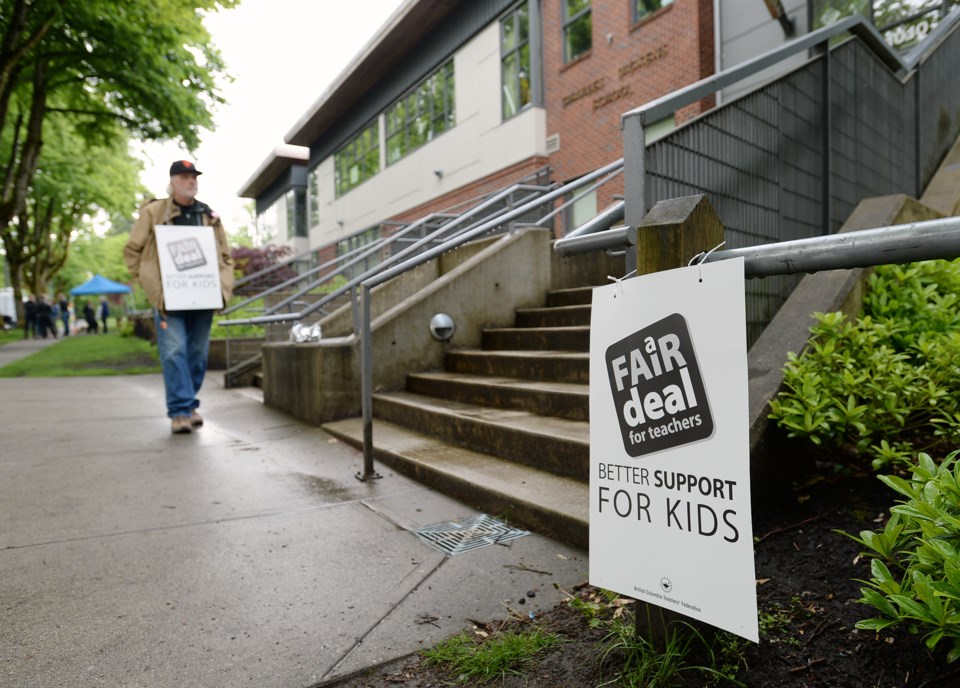Two days after Education Minister Peter Fassbender rejected a call by the B.C. Teacher’s Federation for binding arbitration, he scorned the BCTF’s plan to have teachers vote Sept. 10 on suspending the strike in favour of binding arbitration.
“I’m standing here again and I feel little bit like Groundhog Day, like I’m reliving this discussion time and time again and having real difficulty understanding why we’re not seeing a change in position by the B.C. Teachers’ Federation,” Fassbender said Monday afternoon.
He called for the BCTF have teachers vote on suspending the strike in favour of negotiation and mediation, to get the federation’s wage and benefits proposals into the “affordability zone” so then they could focus on ways to improve class size and composition.
BCTF president Jim Iker announced the vote Monday morning.
“The B.C. Liberal government’s rejection of binding arbitration was a political knee-jerk reaction,” Iker said. “Binding arbitration remains the fastest and most effective way to end the strike, to reach a fair settlement and get students back in classrooms. Today we’re giving government another chance.”
Fassbender said Saturday that Peter Cameron, lead negotiator for the B.C. Public School Employer’s Association, advised him to reject the BCTF’s call Friday morning for binding arbitration, according to a statement emailed from the Ministry of Education.
“After due diligence and further investigation, it became very clear that it was another empty effort to give parents and teachers a false hope that there is a simple way to resolve this dispute,” Fassbender is quoted as saying.
The BCTF proposes to send the issues of compensation, benefits and preparation time to binding arbitration. Compensation includes salaries and a potential signing bonus.
Iker says the BCTF will largely leave class size and composition to the courts.
But the BCTF’s framework for binding arbitration proposes the parties would enter into side negotiations regarding a new fund to address learning needs now. If the parties can’t agree on a new fund, the BCTF also proposes solving the issue through binding arbitration.
The BCTF wants the government and BCPSEA to strike the E80 proposal that Iker maintains would supersede a Court of Appeal decision.
The sentence that worries the BCTF in the E80 proposal reads: “Note: These provisions superseded and replace all previous Articles that addressed class size, composition and staffing levels.”
But Fassbender said E80 is open to change and negotiation.
“It was not and is not, clearly, any attempt to compromise any of the teachers’ rights,” Fassbender said Friday.
The B.C. Supreme Court has twice ruled the government illegally stripped language about class size and composition from teachers’ contracts. The case is now at the Court of Appeal. Fassbender said the case could progress to the Supreme Court of Canada and not be decided for four or five years.
Cameron and Fassbender balked at the preconditions the BCTF attached to binding arbitration.
“The BCTF leadership is trying to avoid having the tough conversation with their members about what is realistic and achievable at the bargaining table,” Fassbender is quoted as saying in the Ministry of Education release, Saturday.
Premier Christy Clark called for teachers to end the strike at a press conference Wednesday. She said classroom composition is the most important issue so the BCTF should agree with BCPSEA proposal on wages and benefits so negotiations can focus on this most important concern.
The Vancouver School Board has been calling for binding arbitration since July and the Vancouver District Parent Advisory Council added its support for binding arbitration at the end of August.
twitter.com/Cheryl_Rossi



